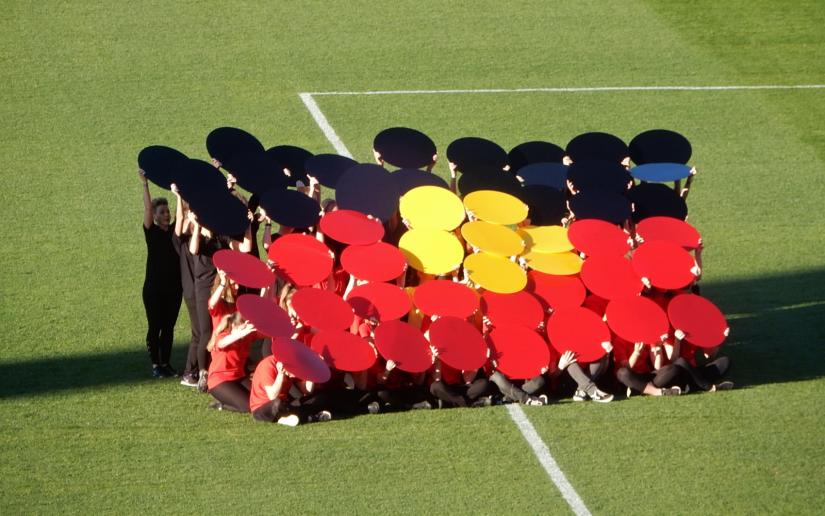While sports bodies are notable advocates of a Voice to parliament, they might want to consider how much of a voice Indigenous athletes have in their own organisation write Daryl Adair and John Evans.

Picture by Michael Coghlan on Flickr (CC BY-SA 2.0)
More than 20 prominent Australian sport bodies have taken a united stand, publicly declaring their support for a “yes” vote on the Indigenous Voice to parliament.
Why, as custodians of sport, have they chosen to take a public stance on a political issue that transcends the athletic domain? And why are they advocating for a “yes” vote?
Some proponents of the “no” vote contend that sports bodies should have no place in political debate. The role of sport organisations, they argue, ought to be simple: they organise competitions and manage athletes.
However, sports bodies have a charter to be engaged with the community and are committed to numerous groups and causes. Pathways and support for Indigenous people are a core part of sports having a sense of social responsibility – they don’t function in a socio-political bubble.
That said, sport organisations have often been ineffective custodians for Indigenous players’ personal and professional development. Indeed, while First Nations people have long been notable performers in many sports, rarely have they had a voice in the running of their workplaces. What’s more, many Indigenous athletes have suffered racism on the job.
So, while sports bodies are notable advocates of a Voice to parliament, they might want to consider how much of a voice Indigenous athletes have in their own organisations.
Why a ‘yes’ vote?
Sport organisations provide opportunities for Indigenous athletes, whom they value for their talent.
But there’s now more to it than that. Many sport bodies have made commitments to the wellbeing of their Indigenous employees.
Multiple sports feature Reconciliation Action Plans, and Indigenous cultures often feature in the pre-match ceremonies of major sport events, such as the Welcome to Country. There are also dedicated Indigenous rounds in the AFL, NRL and Super Netball.
Given many sport bodies are committed to Indigenous wellbeing and community engagement, it seems logical for sports bodies to publicly support the Voice proposal.
However, whether those sports bodies are sufficiently earnest or live up to the ideals enshrined in the Uluru Statement from the Heart is a more complicated question, as suggested by recent investigations into historical racism in the AFL.
Political advocacy
The interplay of sport organisations and social and political causes is hardly new. In Australia, an obvious recent example is the vote for same-sex marriage, which was supported by numerous sports bodies.
These organisations have core values around cultural diversity and policies to promote inclusion, so their support of the “yes” campaign was hardly surprising.
But this didn’t mean universal acceptance: some within sport took a different view, most notably fundamentalist religious followers.
In terms of the Voice campaign, sport organisations appear to have undergone their own due diligence in terms of finalising a position. The AFL, for example, organised educational seminars about the referendum and conducted anonymous polls among staff and players with the aim of aligning its own position with that of its workforce.
This has been a process of consultation rather than indoctrination. For example, “no” campaign leader Nyunggai Warren Mundine was invited to speak at Collingwood Football Club. He said “They got the ‘yes’ campaign to do a presentation and then they got me to come in and give a presentation – that’s the way to do it”.
That said, it’s difficult to find either a sports body or an athlete publicly advocating “no” to the Voice.
Whereas rugby star Israel Folau used his public profile to galvanise opposition to the same-sex marriage proposal in 2017, there’s no equivalent athlete campaigner opposed to the Voice.
Voices against sport
In the meantime, there’s plenty of angst among “no” campaigners that sports are supporting the “yes” vote. It is, of course, reasonable to ponder whether they would hold that view if the sports advocated a “no” vote.
But, leaving that aside, what are the misgivings about sports bodies taking a public position?
Former Australian Prime Minister John Howard, well known for donning a green and gold tracksuit for photo opportunities during Wallabies Tests or the Olympics, contends that sports bodies have no place taking a stand on the Voice: voting, he stresses, is a matter for individuals, and leagues cannot speak for them.
For Howard, sport should only be an “escape” from politics, with fans mingling to focus on having a good time and cheering their team.
Current Opposition Leader Peter Dutton takes a similar view, but argues that sports fans are being lectured to by “elites” within leagues like the AFL or the NRL. The inference here is that a coterie of sport executives has conspired to dictate a position in the absence of any consultation.
Sport, from the perspective of these naysayers, should be silent on the Voice.
Yet that perspective overlooks the way sport is run today.
Social responsibility
Whether the same-sex marriage campaign, empowerment of women or climate change, sports increasingly take a view because they have a responsibility.
Sports bodies have mission statements declaring contributions to society, among which is support for groups and communities that, historically, have been on the margins of the nation’s sporting culture.
That said, Indigenous employees within sport have long been rendered peripheral to decision making. Sports bodies have too often not consulted First Nations’ players or administrators when making decisions for the “good of the game”.
Yet, at the same time, they celebrate Indigenous peoples for their substantial contribution to sport.
When sports bodies say they support a Voice to parliament, they might also reflect on what that looks like in their own backyards.
Daryl Adair, Associate Professor of Sport Management, University of Technology Sydney and John Evans, Pro Vice-Chancellor (Indigenous Engagement) and Professor, Swinburne University of Technology
This article is republished from The Conversation under a Creative Commons license. Read the original article.

